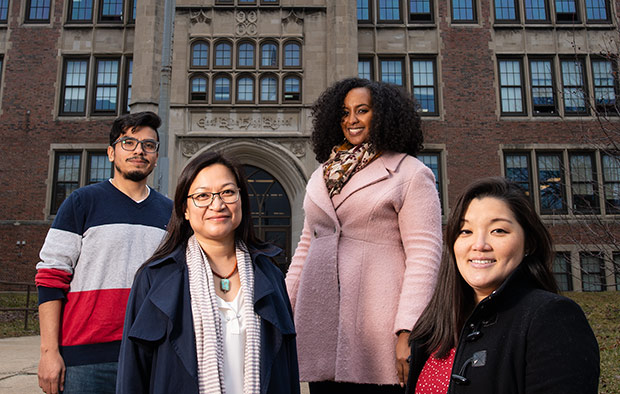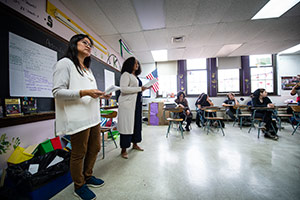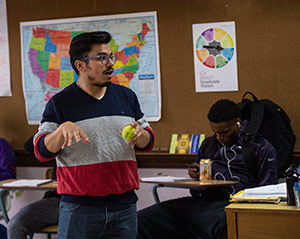Program exposes students to diversity, possibility in legal profession
By: Michaela Paukner, [email protected]//April 1, 2020//
Program exposes students to diversity, possibility in legal profession
By: Michaela Paukner, [email protected]//April 1, 2020//

On a dreary February day in Madison, Makda Fessahaye and Leakhena Au showed up for class at Madison East High School on internment camps and equal protection.
Fessahaye, the administrator for the Wisconsin Department of Corrections’ Division of Adult Institutions, and Au, a 3L student at UW Law School, were presenting their information to a room of juniors and seniors. When they arrived in Mr. Cesar Martinez’s classroom, his students were finishing lunch, talking and watching episodes of “Gentefied,” a bilingual Netflix comedy series. As class started, Martinez handed out materials related to the pending discussion.
Fessahaye and Au began by taking up what they called Gorbea v. U.S., a fictional case drawing on the actual facts in Korematsu v. U.S. Gorbea postulates an internment camp set up to detain U.S. citizens of Mexican descent as a response to an attack by Mexican citizens on a Texas detention center.
Martinez, Fessahaye and Au start asking questions, encouraging the students to consider what hypothetically happened in the fictional case. Although at first a bit hesitant to participate, the students soon enough begin discussing discrimination, profiling and the legality of such detainments.
This is the fifth lesson in the Tipping the Scales program, which brings diverse attorneys into Martinez’s civics class to teach students about current legal issues.
“The point is to illuminate to students that the law is all around us and going to law school is not a magical thing,” said Michelle Yun, senior attorney at Alliant Energy and founder of Tipping the Scales. “You don’t need a certain kind of brain to go there. You don’t need a certain kind of last name or look about you, and it can be really fun.”
Intentional diversity

Yun started devising Tipping the Scales last year with encouragement from her boss, the Alliant Energy general counsel Jim Gallegos. Yun had participated in similar programs at previous jobs — giving her examples of what works and the benefits such initiatives can have for students.
She began building a series of lesson plans topical to 2020 and recruiting attorneys with a range of personal and professional experience as teachers.
“We were really intentional about trying to create multiple voices of diversity because you never know what will resonate with a student,” Yun said. “To see many different types of diversity is a really neat experience for students.”
The Wisconsin Association of African-American Lawyers is one of the program’s current partners. Fessahaye, the association’s president, said WAAL is devoted to showing students of color that a career in the legal field is possible.
“I’m the first lawyer in my family,” Fessahaye said. “I didn’t have anyone in my family to go to growing up as I became interested in the law, so to be that person for others is really important.”
The lack of representation was apparent when Yun asked students about their dealings with lawyers at the program’s start. She said very few of the students who had worked with a lawyer said they had a good experience. Only one student had dealt with a lawyer who’s a woman or a person of color. That student’s mother is an attorney.
“It’s really important to be visible in the community,” Fessahaye said. “For those who are looking to truly diversify the legal profession, which is a male-dominated, white profession historically, you have to start putting that plug into students’ minds early.”
Big issues, ‘astounding’ questions
Tipping the Scales has about 40 volunteers. They teach Martinez’s civics class in pairs of two, doing so about every other week since January. Yun said Alliant Energy’s charitable foundation had already worked with Madison East on other programs, and the high school’s civics class was a natural fit for what she wanted to do.
The class discusses topics like race, ethnicity and how students see themselves and others. Tipping the Scales looks at the legalities of issues like racial profiling, juvenile justice and transgender access.
“The questions that they ask are really astounding,” Yun said. “One of the questions I got from one of the students was, ‘When you take the bar exam, is there a section on bias, and how does the bar measure lawyers’ bias?’ It’s such a great question.”
Fessahaye has taught several classes and says students are enthusiastic about the material. As part of the discussion, she challenged students to defend a position they didn’t agree with.
“What we emphasize to them is that there are cases where maybe morally or personally we don’t agree, but we have a legal obligation to our clients,” Fessahaye said. “You could tell that their minds started to spin once they realized they could take a position one way or another.”
As students start to take an interest in the law, Tipping the Scales is achieving Yun’s larger goal — bringing about a more diverse future for Wisconsin’s legal profession.
“If we’re really going to be serious about diversity in the bar, we need to work hard at developing the resources we have right at home,” Yun said. “Some of the best, brightest and most diverse minds are people who already live in the state.”
Expansion opportunities

Yun said she’s overjoyed by the response she has seen to Tipping the Scales. Volunteers believe in its importance and the difference it is making for students.
“It’s important to give back and give people a sense of their rights,” Au said. “People need to know they can stand up for themselves.”
Many volunteers and other people have asked Yun about bringing Tipping the Scales to more schools and cities. Yun said Gallegos and Alliant Energy are supportive of her plans to broaden the program, but she also needs help from the legal profession to make that happen.
“I would love to see this grow,” Yun said. “It just is a question of volunteers.”
Volunteers now only have to commit to one day of teaching. The lesson plans provide recommendations on how to structure the class, along with all the information the volunteer needs to teach a given topic.
To make Tipping the Scales easy to take to new places, Yun has made the lesson plans modifiable and easy to carry out. All the information can be had free of charge to anyone who wants to make use of the program.
“I am happy if people want to adapt this and use it all over the state of Wisconsin,” Yun said. “Take it wherever you’d like to take it. The sky is the limit.”
Contact Michelle Yun at 608-458-6352 or [email protected] to volunteer for Tipping the Scales or for information about expanding the program to your community.
Legal News
- Wisconsin attorney loses law license, ordered to pay $16K fine
- Former Wisconsin police officer charged with 5 bestiality felony counts
- Judge reject’s Trump’s bid for a new trial in $83.3 million E. Jean Carroll defamation case
- Dozens of deaths reveal risks of injecting sedatives into people restrained by police
- The Latest: Supreme Court arguments conclude in Trump immunity case
- Net neutrality restored as FCC votes to regulate internet providers
- Wisconsin Attorney General asks Congress to expand reproductive health services
- Attorney General Kaul releases update at three-year anniversary of clergy and faith leader abuse initiative
- State Bar leaders remain deeply divided over special purpose trust
- Former Wisconsin college chancellor fired over porn career is fighting to keep his faculty post
- Pecker says he pledged to be Trump campaign’s ‘eyes and ears’ during 2016 race
- A conservative quest to limit diversity programs gains momentum in states
WLJ People
- Power 30 Personal Injury Attorneys – Russell Nicolet
- Power 30 Personal Injury Attorneys – Benjamin Nicolet
- Power 30 Personal Injury Attorneys – Dustin T. Woehl
- Power 30 Personal Injury Attorneys – Katherine Metzger
- Power 30 Personal Injury Attorneys – Joseph Ryan
- Power 30 Personal Injury Attorneys – James M. Ryan
- Power 30 Personal Injury Attorneys – Dana Wachs
- Power 30 Personal Injury Attorneys – Mark L. Thomsen
- Power 30 Personal Injury Attorneys – Matthew Lein
- Power 30 Personal Injury Attorneys – Jeffrey A. Pitman
- Power 30 Personal Injury Attorneys – William Pemberton
- Power 30 Personal Injury Attorneys – Howard S. Sicula











